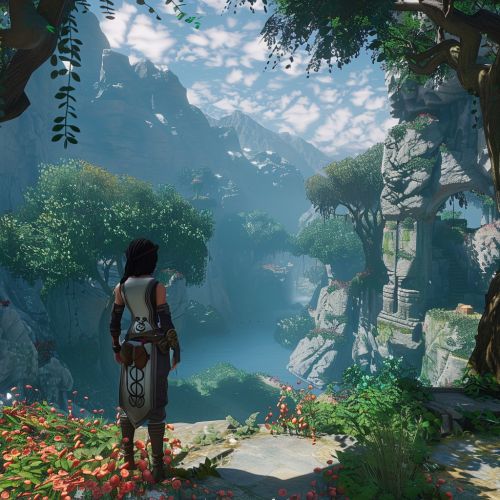Adventure game
Overview
An adventure game is a type of video game characterized by exploration, puzzle-solving, interaction with game characters, and a focus on narrative rather than combat. This genre of games is known for its engaging storylines and immersive gameplay, which often involve solving complex puzzles and making decisions that affect the game's outcome.
History
The history of adventure games is rich and varied, with the genre evolving significantly since its inception. The first adventure game, Colossal Cave Adventure, was developed in 1976 by Will Crowther, a programmer and caving enthusiast. This text-based game laid the groundwork for the genre, introducing elements such as exploration and puzzle-solving that would become staples of adventure games.
In the 1980s, companies like Sierra On-Line and Lucasfilm Games (later LucasArts) further developed the genre, introducing graphical interfaces and point-and-click mechanics. Games like King's Quest and The Secret of Monkey Island became iconic titles, known for their intricate puzzles, humorous dialogue, and memorable characters.
The 1990s saw the rise of more cinematic adventure games, with titles like Myst and The Longest Journey offering deeper narratives and more immersive environments. However, the late 1990s and early 2000s saw a decline in the popularity of adventure games, as action and role-playing games became more prevalent.
The genre experienced a resurgence in the late 2000s and early 2010s, with the rise of indie game development and digital distribution platforms like Steam. Modern adventure games, such as those developed by Telltale Games, often feature episodic storytelling and choice-driven narratives.
Gameplay
Adventure games are primarily focused on exploration, puzzle-solving, and narrative. Players typically navigate a series of environments, interacting with objects and characters to progress the story. Puzzles are a common element, often requiring players to use items in their inventory or interact with the environment in specific ways.
Many adventure games feature a point-and-click interface, where players control their character by clicking on the screen. Other games use a direct control scheme, where players move their character using a keyboard or gamepad.
Narrative is a crucial aspect of adventure games, with many games featuring complex plots and character development. Dialogue is often used to convey the story, with players frequently given the option to choose their character's responses. These choices can affect the game's outcome, leading to multiple possible endings.
Sub-genres
Adventure games encompass a wide range of sub-genres, each with its own unique characteristics.
- Graphic adventure games: These games feature graphical interfaces and often use a point-and-click interface. They are known for their detailed artwork and complex narratives.
- Interactive fiction: Also known as text adventures, these games primarily use text to convey the game's story and environment. Players interact with the game by typing commands, such as "look" or "open door".
- Visual novel: Originating from Japan, visual novels are a sub-genre that focuses heavily on narrative and character interaction. They often feature anime-style artwork and multiple branching storylines.
- Walking simulator: A term often used pejoratively, walking simulators are games that focus primarily on exploration and narrative, with little to no gameplay mechanics or puzzles.
Impact and Influence
Adventure games have had a significant impact on the video game industry, influencing the design of games in other genres and pushing the boundaries of narrative storytelling in games. The focus on narrative and character development in adventure games has paved the way for more story-driven games in other genres.
The genre has also had a cultural impact, with many adventure games being recognized for their artistic value. Games like Grim Fandango and Broken Age have been praised for their unique art styles and engaging narratives, while others like Life is Strange and Gone Home have been lauded for their exploration of social issues.
Future of Adventure Games
The future of adventure games looks promising, with new titles being released regularly and the genre continuing to evolve. The rise of virtual reality technology offers new opportunities for immersion and interactivity, and the continued popularity of indie games suggests that there will be a steady stream of innovative and creative adventure games in the years to come.


